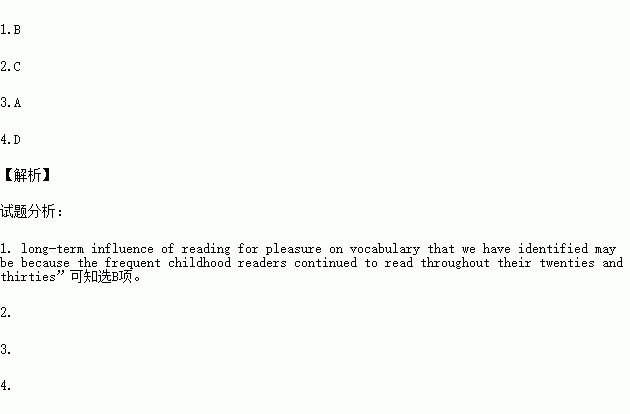题目内容
阅读理解。
Children who read for pleasure at the age of 10 have far higher vocabulary scores by the age of 42.
Researchers at the Institute of Education(IOE)have found that the most crazy childhood readers score far higher on vocabulary tests 30 years later.The new study suggests that children who read for pleasure carry the intellectual(智力的)benefits with them far into adulthood.
“The long-term influence of reading for pleasure on vocabulary that we have identified may be because the frequent childhood readers continued to read throughout their twenties and thirties,”says lead author Professor Alice Sullivan at the IOE.Researchers followed 9,400 British people from the age of 10 up to 42.Their vocabulary was tested using a simple quiz which asked participants to match up words to the most similar meaning.
Those who had regularly read for pleasure at 10 scored 67 percent at the age of 42,while infrequent childhood readers scored only 51 percent.
The IOE study also found that what people chose to read as adults mattered as much as how often they read.The greatest improvements between ages 16 and 42 were made by readers of ‘elegant’ fictions such as Booker Prize winning novels.And they found that readers of quality newspapers,including online versions,made more progress in vocabulary throughout their lives than those who read tabloids.
In addition,generally speaking,the adult readers who especially read broadsheets(宽幅印刷品)scored 76 percent on the assessment compared to 57 percent amongst those who didn’t.
1.Why did frequent childhood readers have higher vocabulary scores?
A.Because they are born intelligent.
B.Because they formed the consistent reading habit.
C.Because they were crazy about pleasure.
D.Because they had a comfortable childhood.
2.What may not affect the adult readers’ vocabulary scores?
A.The contents of reading.
B.The design of the page.
C.Versions online or not.
D.The frequency of reading.
3.What does the underlined word“tabloids”mean in the text?
A.Newspapers of low quality.
B.Newspapers of high quality.
C.Elegant fictions.
D.Large vocabulary.
4.What does the text mainly tell us?
A.Intelligence has a great influence on vocabulary.
B.Reading materials matter much for children.
C.Broadsheet newspapers are best for boosting vocabulary.
D.Children who read for pleasure have larger vocabulary when they grow up.

